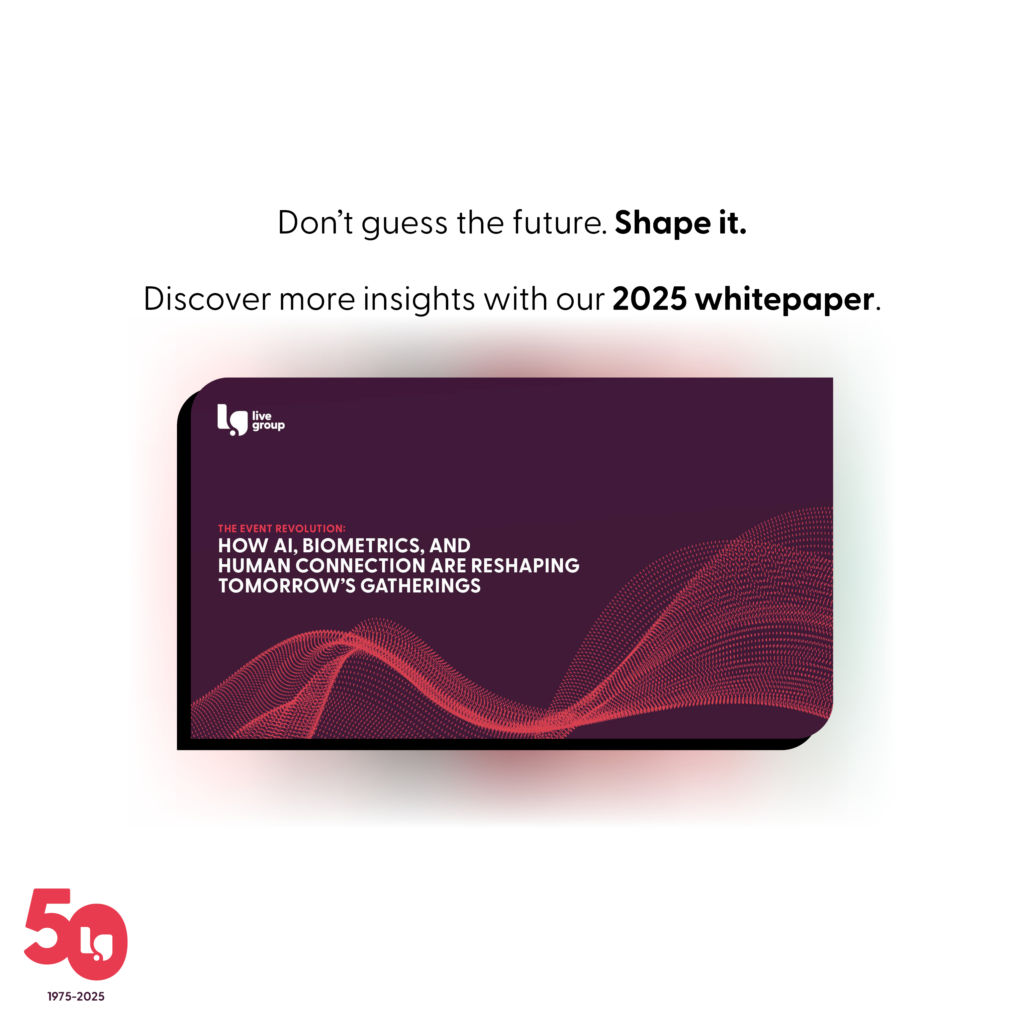Planning a successful event starts with a solid strategy – and this event management checklist is your essential guide to navigating the challenges of event planning, live event management, and coordinating every detail with confidence.
You’re unlikely to remember the most mediocre event you ever attended. However, even the events that played it the safest are not without peril. Embracing the status quo and erring on the side of caution places your event at risk of mediocrity. Daring to fail, however, at least better positions you to create something truly memorable.
Yet with stretched budgets, high stakeholder expectations, and scarcity of resources, creative risks can feel daunting.
It’s important to note that being slow to introduce necessary changes and innovations can make it increasingly difficult to keep up with industry developments in the long run. Without adapting, the impact and value you create for your organisation and audience will diminish, eroding the reasons for them to continue investing in or participating in your events.
This stagnation not only hinders growth but also risks turning your event into a cost that’s harder to justify year after year, making it increasingly difficult to secure future budgets. In today’s fast-moving market landscape, staying static isn’t an option. To remain relevant and continue driving business growth, event planning must embrace change and continuous evolution.

Technology advancements have enabled live event management platforms to support organisers in testing and measuring new ideas by leveraging real-time data and predictive analytics. By providing insights into audience engagement and preferences, organisers can trial innovative approaches in controlled segments, assess their impact, and refine strategies before scaling them across the event.
Taking calculated risks wasn’t always a luxury afforded to all. But with the right tools, it’s possible to assess or predict the impact of trying something different. Your next event doesn’t need to be a trial run for new ideas, and you don’t need to harm your brand in the pursuit of innovation.
Event Management Checklist: Essential KPIs for Risk Management
- Identify Risks – Use past data and experience to assess potential challenges.
- Develop a Mitigation Plan – Leverage expert advice and predictive analytics.
- Engage Stakeholders – Communicate risks and benefits effectively.
- Align with Business Goals – Ensure innovation delivers measurable value.
- Set KPIs – Define clear metrics to track progress.
- Invest in Technology – Enable data collection and real-time monitoring.
- Adopt Real-Time Feedback – Adjust strategies dynamically.
- Analyse & Improve – Evaluate data to refine and enhance performance.
Meeting Stakeholder Expectations on a Tight Budget
Meeting growing expectations with shrinking budgets requires strategic planning, prioritisation, and effective use of technology.
Start by understanding the core objectives of key stakeholders involved in organising the event, and focus on the essentials that will drive value for your audience while supporting the organisation’s business goals. Early alignment on key performance indicators (KPIs) is crucial – ensure you and your stakeholders agree on the right metrics and manage expectations from the outset.
How to plan an event successfully? Focus your resources where they will have the greatest impact.
For example, if the event’s focus is networking, allocate budget towards smart networking tools, pre-event engagement, and virtual meeting options, rather than lavish dining or entertainment. Track metrics like: Connections made, Meetings booked or Virtual engagement – Instead of relying purely on traditional metrics like attendance rates or catering satisfaction.
However, if the event is focused on launching a new product or sharing your company’s new strategies and ambitions, your goal will be to engage your audience and ensure they understand and embrace the messages being delivered. In this case, personalisation becomes critical.
Invest in technology that delivers personalised event experiences and content tailored to individual attendees. Use emerging technologies to gain deeper insights into attendee behaviour, tracking both active and passive participation.
For example, monitor:
- The sessions attendees engaged with
- Resources they downloaded
- Contributions to discussion forums
This comprehensive data will enable organisers to present a complete picture of engagement, showing the true impact of the event beyond traditional metrics. Integrating event data with your CRM allows you to provide tangible evidence of success, such as networking effectiveness, content engagement, and post-event impact.
By showcasing these measurable results, you can demonstrate the value you’ve delivered and secure future budget allocations. Ultimately, invest in what truly matters—focusing on the elements that help you prove your success, rather than simply tracking what’s easiest to measure.
Event Management Checklist: Essential KPIs for Measuring Event Success
- Connections made
- Meetings booked
- Virtual engagement
- Active and passive participation
- Resources downloaded
- Discussion thread contribution
Overcoming Common Event Challenges: Sustainability and Inclusivity in Live Event Management
Common event challenges today include balancing logistics while ensuring sustainability and inclusivity.
Inclusivity isn’t just about ticking diversity checkboxes. It’s about recognising how diverse perspectives enrich conversations, drive innovation, and elevate event outcomes. An inclusivity-first approach involves proactively creating spaces that welcome attendees and speakers from a variety of backgrounds – encompassing not only gender, race, and ethnicity but also age, neurodivergence, and physical and learning abilities.
Live event management tools and audience profiling technology can help organisers gain deeper insights into attendee needs, from learning styles to preferred communication methods. This data allows planners to tailor every aspect of the event—from digital experiences and networking opportunities to content delivery formats and on-site accommodations – for both neurotypical and neurodivergent participants.
By employing such tools, you can create a more personalised and engaging experience that meets the unique needs of your diverse audience.
Delivering sustainable and inclusive events doesn’t come without its challenges. It demands a shift away from outdated methods towards a more thoughtful approach—but one that creates better outcomes.
An event that prioritises sustainability or inclusivity no longer offers a competitive edge; it’s the bare minimum expectation. The challenge lies in striking a balance between creating memorable experiences and addressing environmental and social responsibilities.
The key is not to view these measures as logistical hurdles but as opportunities to innovate and enhance the event experience.
Sustainability in event planning means shifting from purely superficial measures to embedding eco-consciousness into the core of event design and planning. This comes from data-driven decision-making and using tools such as Trace by Isla, which can help organisers monitor carbon emissions before the event even begins. Small changes like choosing sustainable hotels or consolidating deliveries can also make a big difference.

Event Management Checklist: Essential KPIs for Measuring Event Sustainability
- Carbon tracking
- Reduction in single-use materials used
- CO₂ saved through consolidated deliveries and transport logistics
- Percentage of event energy powered by renewable sources.
- Participation rates in feedback surveys from all demographic groups.
- Feedback scores from neurodivergent attendees, or those with physical disabilities.
Event Planning Success: A Step by Step Guide
Step 1: Define Your Event Goals
Start by asking: What’s the purpose of this event?
- Identify objectives: Is it to educate, celebrate, network, or raise funds?
- Know your audience: Tailor the experience to their preferences and needs.
- Set a budget: Allocate funds for venues, catering, marketing, and contingencies (aim for a 10–15% buffer).
Pro Tip: Use tools like spreadsheets or budgeting apps to track expenses in real time.

Step 2: Choose the Right Venue and Vendors
Your venue sets the tone for your event. When searching for event planners near you, many professionals have partnerships with top venues and vendors. Here’s what to consider:
- Location: Is it accessible for attendees?
- Capacity: Ensure the space accommodates your guest list comfortably.
- Amenities: Check for AV equipment, parking, and catering options.
Vendor Checklist:
- Caterers
- Audiovisual teams
- Decorators
- Entertainment
Negotiate contracts carefully and confirm cancellation policies.
Step 3: Create a Timeline and Master Checklist
A detailed timeline keeps everyone on track. Below is a sample framework:
8–12 Weeks Before:
- Finalise venue and vendors.
- Send save-the-dates (if applicable).
- Begin marketing (social media, emails, posters).
4–6 Weeks Before:
- Confirm vendor contracts.
- Finalise guest list and send invitations.
- Plan event logistics (seating charts, signage).
1–2 Weeks Before:
- Conduct a venue walkthrough.
- Confirm deliveries and setup times.
- Brief speakers or performers.
Day of the Event:
- Arrive early to oversee setup.
- Keep an emergency kit (tape, scissors, first aid).
- Assign roles to your team or event coordinator.

Step 4: Promote Your Event
Even the best-planned event needs an audience. Use a mix of strategies:
- Social media: Create event pages and use hashtags.
- Email campaigns: Send reminders and teasers.
- Partnerships: Collaborate with influencers or local businesses.
Step 5: Hire Professional Help: Event Planners Near You
If the workload feels daunting, hiring an event coordinator or event planner can be a game-changer. Here’s why:
- Expertise: They handle permits, contracts, and troubleshooting.
- Vendor networks: Access to trusted, high-quality services.
- Stress reduction: Focus on enjoying your event while they manage details.
How to Find the Best Event Planners Near You:
- Search “event planners near me” online and review portfolios.
- Check reviews on Google, Yelp, or industry platforms like Global Event Suppliers.
- Interview candidates to ensure they align with your vision and budget.

Event Planning Checklist: Quick Reference
Keep this list handy to avoid missing critical steps:
- Define goals and budget
- Book venue and secure vendors
- Finalise guest list and send invites
- Confirm logistics (seating, parking, security)
- Create a run sheet for the event day
- Prepare contingency plans (weather, tech issues)
- Conduct a post-event debrief

Post-Event Follow-Up
Don’t forget to:
- Thank attendees, vendors, and sponsors.
- Gather feedback via surveys.
- Analyse ROI (e.g., sales generated, social media engagement).
Download our latest report to explore the latest event solutions, learn how event production agencies are leveraging technology for seamless conference planning, and uncover strategies to enhance hybrid event management.






